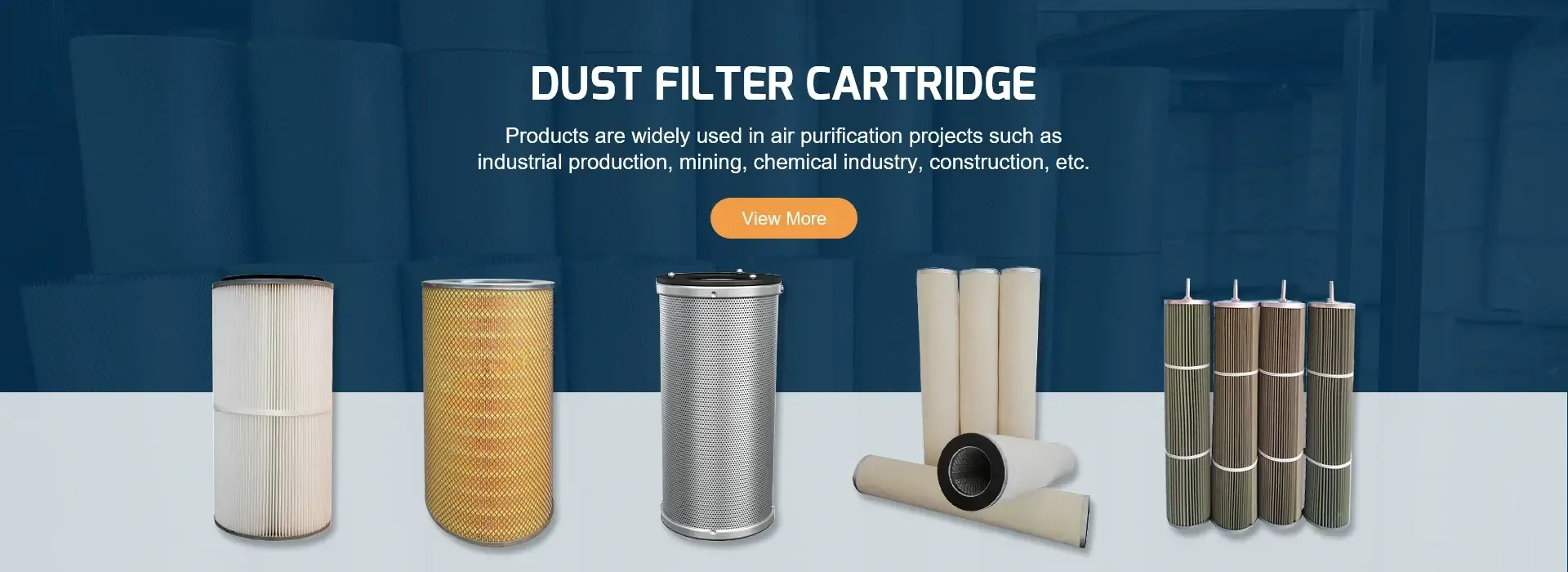 Tel:
+8615930870079
Tel:
+8615930870079
nov. . 08, 2024 13:15 Back to list
High-Efficiency Cartridge Filters for Industrial Dust Collection Systems
Understanding Industrial Dust Collector Cartridge Filters
In today’s industrial landscape, managing airborne particles is a critical concern for ensuring a safe and efficient working environment. One of the most effective systems employed for this purpose is the industrial dust collector, particularly those utilizing cartridge filters. These units play a pivotal role across various industries by collecting and filtering dust and other pollutants from the air, thereby maintaining air quality and compliance with health regulations.
What Are Cartridge Filters?
Cartridge filters are specialized filtration components designed to trap dust particles, smoke, and other airborne contaminants found in industrial settings. These filters are typically cylindrical in shape and contain a pleated design that maximizes the surface area available for dust collection. The pleating enables them to capture larger volumes of particulate matter while maintaining a smaller physical footprint, which is advantageous in space-constrained environments.
How Do Cartridge Filters Work?
The mechanism behind industrial dust collector cartridge filters is relatively straightforward. Air containing dust particles is drawn into the collector, where it passes through the cartridge filter. The filter material captures the dust particles while allowing clean air to exit the unit. Over time, as dust accumulates, the resistance within the filter increases, leading to reduced airflow. To combat this, modern dust collectors are often equipped with automatic pulsing systems that periodically clean the filters by releasing bursts of compressed air, dislodging the trapped dust back into the collector, thus restoring airflow efficiency.
Benefits of Using Cartridge Filters
1. High Filtration Efficiency Cartridge filters can achieve high levels of dust capture efficiency, often surpassing 99%. This is essential in industries where air quality is paramount, such as pharmaceuticals and food processing.
industrial dust collector cartridge filters

2. Compact Design The pleated design of cartridge filters means that they occupy less space and can be retrofitted into existing dust collection systems, making them a versatile option for various applications.
3. Ease of Maintenance With automatic cleaning capabilities, these filters require less routine maintenance than traditional bag filters, saving time and reducing operational costs.
4. Cost-Effective Although the initial investment may be higher than some alternatives, the long service life and lower energy consumption associated with cartridge filters lead to cost savings over time.
5. Versatility Cartridge filters are available in various materials, including fiberglass, polyester, and more, allowing for customization based on the specific dust types and operational conditions in different industries.
Applications of Cartridge Filters
Cartridge filters are widely utilized across multiple industries. In woodworking, they help manage wood dust particles, which can be hazardous to health. In metalworking, these filters manage fine metal shavings and chips, protecting both machinery and workers. The food and beverage industry also employs cartridge filters to ensure that airborne contaminants do not compromise product quality.
Conclusion
In summary, industrial dust collector cartridge filters are a critical component in maintaining clean air in manufacturing and processing environments. Their high efficiency, compact design, and ease of maintenance make them a preferred choice for industries aiming to comply with health and safety regulations while ensuring worker safety. As industries continue to advance and evolve, the role of cartridge filters in pollution control will remain integral, contributing to both the sustainability of operations and the health of employees. Investing in quality cartridge filters is not merely a regulatory requirement but a commitment to fostering a safer and more productive workspace.
-
Types and Applications of Air Filtration CartridgesNewsJul.28,2025
-
The Role of Gas Turbine FiltersNewsJul.28,2025
-
Mastering Air Filter Cartridge UseNewsJul.28,2025
-
Advanced Turbine Filters for Modern Gas TurbinesNewsJul.28,2025
-
Cellulose Air Filter Cartridge Advantages in Dust FiltrationNewsJul.28,2025
-
Cellulose Filters for Air Particle ReductionNewsJul.28,2025

 Email:
Email:





